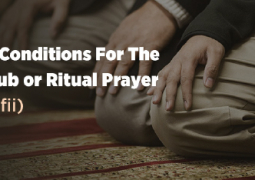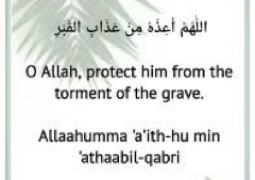Funeral Prayer, Its Legal Status
There is a consensus among all the great Muslim jurists that a funeral prayer for a deceased person is a collective obligation or fard kifayah. The Prophet, peace be upon him, commanded the Muslims to offer it, and they have been doing so ever since they received this commandment.
Abu Hurairah reported that when the Prophet, peace be upon him, was informed of the death of a person, he used to ask: Does he owe anything to anyone?’ If the answer was in the affirmative, he would then ask: ‘Has he (the deceased) left anything to settle his debt?’ If he had left something to settle his debt, he would offer the funeral prayer for him. Otherwise, he would say to the Muslims: ‘Offer a (funeral) prayer for your brother”’ (Bukhari and Muslim).
Reward for Offering Funeral Prayer
Abu Hurairah narrates that the Prophet, peace be upon him, said: “Whoever follows a funeral procession and offers the prayer for the deceased, will get one kerat 68 of reward. And whoever follows it and remains with it until the body is buried, will get two kerats of reward, the least of which is equal in weight to ‘Mount Uhud’ or he said ‘one of them is like Uhud.’ The narrator is not certain as to the exact words used by the Prophet, peace be upon him. This is reported by the group.
Khabbab reported that he asked “O ‘Abdullah Ibn ‘Umar! Did you hear what Abu Hurairah says? He says that he heard Allah’s Messenger, saying. ‘Whoever leaves his house to attend a funeral prayer, offers funeral prayer, and then follows the funeral procession until the body is buried will receive two kerats of reward, each of which is like the mountain of Uhud. And whoever offers the funeral prayer and then leaves for home (This proves that a person does not need permission of the family of the deceased to leave after attending the funeral) will get a reward like the mountain of Uhud” (Muslim). Ibn ‘Umar sent Khabbab to ‘Aishah asking her about the statement of Abu Hurairah. She said, “Abu Hurairah has told the truth.” When Ibn ‘ Umar was informed about this he said, “We have indeed lost many a kerat.”
Requisite Conditions for Funeral Prayer
The prerequisites for a funeral prayer are the same as for the obligatory prayers. Anyone intending to offer funeral prayer must be in a state of purity, be free from all minor and major impurities, must cover his or her “awrah,” and stand facing the direction of the Ka’bah.
Malik reported from Nafi’ that Abdullah Ibn ‘Umar used to say: “One should not offer a funeral prayer unless he is in a state of purity.”The funeral prayer differs from the prescribed prayers in that there is no fixed time for offering it. It may be offered at any time, including the times when regular prayers may not be offered. This is the opinion of the Hanafi and Shafi’i schools. Ahmad, Ibn Al-Mubarak, and Ishaq dislike offering a funeral prayer at sunrise, at noon when the sun is at its zenith, and at dusk when the sun is about to set, except in cases when it is feared that if delayed, the body might decompose.
Main Requirements of the Funeral Prayer
Certain requirements must be met for a valid funeral prayer, and failure to meet any of these may invalidate the prayer. These requirements are given below:
- Intention
The real intention is what is in the heart, and its verbal utterance is not legally required. Allah says in the Qur’an: “And they have been commanded no more than this: To worship Allah, offering Him sincere devotion, being true in (faith).” Qur’an 98.5 And the Prophet, peace be upon him, said: “Verily, all deeds (of a person) will be judged in the light of the intentions behind them, and every person will attain what he intends.”
- Standing Prayer
The majority of scholars regard it as an essential condition for a valid funeral prayer to stand while praying if one is physically able to do so. A funeral prayer offered while sitting or riding, without any valid excuse, is not valid. It is reported in Al-Mughni “It is not permissible for one to offer a funeral prayer while riding, as in this case an essential condition - standing while praying - would be missing.” This is the opinion of Abu Hanifah, Ash-Shafi’i, and Abu Thaur. There is no difference on this point. It is preferable to put one’s hands together, placing the right on the left, as is done in the prescribed regular prayer. Some disagree, but in our view it is better and preferable.
- Loud Recitation of Four Takbirs
This is based on a report transmitted by both Bukhari and Muslim on the authority of Jabir who said: “Allah’s Messenger, peace be upon him, offered funeral prayers for Najashi (Negus) and said four takbirs. (That is, he said Allahu Akbar four times)
Tirmizhi said: Most of the learned Companions of the Prophet (may Allah be pleased with them) and others followed and acted in accordance with the above example of the Prophet. They hold that four takbirs should be said in a funeral prayer. Among these scholars are Sufyan, Malik, Ibn Al-Mubarak, Ash-Shafi’i, Ahmad, and Ishaq.
Raising of One’s Hands During the Takbirs
It is Sunnah to raise one’s hands while uttering the first takbir. There is nothing related from the Prophet, peace be upon him, to show that he raised his hands in funeral prayer except for the first takbir. Ash-Shawkani mentions various opinions about takbirs and the arguments for them and says: “In short nothing except the first takhir is reported from the Prophet, peace be upon him. The acts and sayings of the Companions of the Prophet (may Allah bless them) by themselves do not constitute a conclusive argument. Therefore one should raise one’s hands only on saying the first lakhir. For the rest of the (three) takbirs no such instruction is available, except when one changes from one posture to another as in the regular prayer. There is no such change of posture required in the funeral prayer, so there is no need for raising hands in other than the first “takbir”.
Reciting “Al-Fatihah” and Salutations to the Prophet
(Abu Hanifah and Malik regard these as two essential requisites of funeral prayer) Ash-Shafi’i has in his Musnad narrated from Abu Umamah ibn Sahl that one of the Companions of the Prophet (may Allah be pleased with them) told him that when offering a (funeral) prayer it is sunnah for the imam to say aloud Allahu Akbar (first opening takbir), then to recite al-Fatihah silently in his heart, and then send salutations to the Prophet, peace be upon him, and then pray for forgiveness of the deceased. Nothing else is to be recited in between takbirs. Finally, he should end his prayer with salutations in his heart. (According to the majority of scholars, reciting al-fatihah, sending blessings upon the Prophet, supplicating for the deceased, and salutations are Sunnah. In the case of the imam, however, it is Sunnah to utter the takbir and salutations aloud in order to communicate with those praying with him) The author of Al-Fath says: “The chain of narrators of this hadith is sound.” Bukhari reported from Talha ibn Abdullah that he said: “I offered a funeral prayer that was led by Ibn Abbas. He recited Al-Fatihah and said: ‘This is a sunnah of the Prophet, peace be upon him.”’ Tirmizhi also reported this and remarked that this has been the practice of some of the learned among the Companions of the Prophet (may Allah be pleased with them). Others prefer to recite Al-Fatihah after the first takbir. This is the opinion of Ash-Shafi’i, Ahmad, and Ishaq. Some others hold that Al-Fatihah is not to be recited in a funeral prayer. The funeral prayer should consist of praise for Allah (Thana), blessings (salawat) upon the Prophet, peace be upon him, and a prayer (du’a) for forgiveness of the deceased. This is the opinion of Al-Thawri and other scholars of Kufah. Those who hold the recitation of al-Fatihah in a funeral prayer obligatory argue that the Prophet, peace be upon him, called it a prayer (Salat) when he said: “Offer prayer (Sallu) for your deceased friend.” And as no prayer can be complete without al-Fatihah, for the Prophet, peace be upon him, also told us “no prayer is valid unless al-Fatihall is recited in it.”
To be continued





